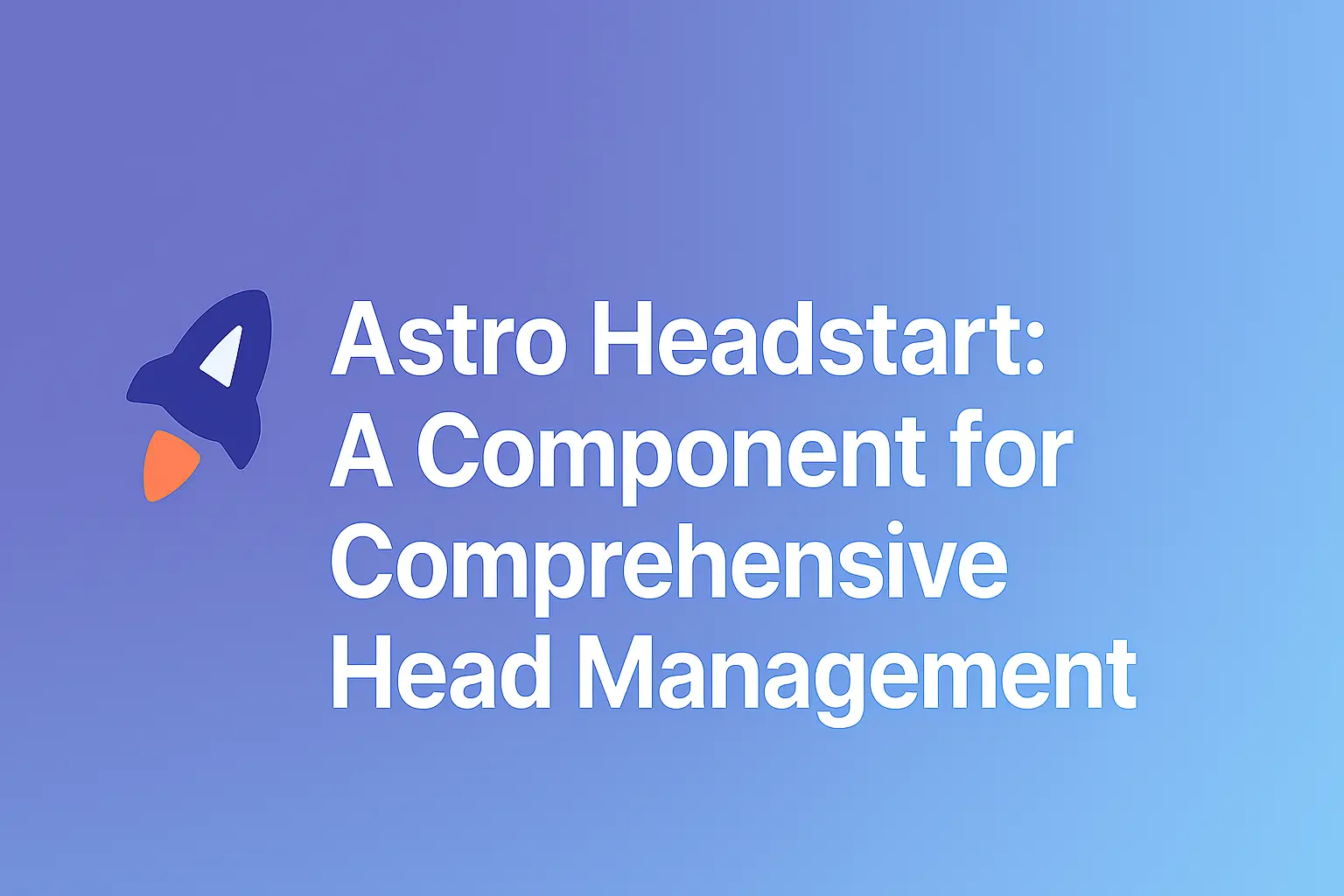Astro Headstart is a specialized utility library that simplifies HTML head tag management in Astro applications.
It allows you to handle both standard HTML metadata and modern social media tags through a single, well-designed API.
Features
🎯 Complete HTML head management through a single <Headstart /> component
📱 Full social media meta tag support for OpenGraph and X.com (Twitter) Cards
🔍 Built-in JSON-LD structured data generation with Schema.org helpers
🧩 Modular architecture with individual component exports
🎨 Theme color and color scheme management for modern browsers
🤖 Search engine optimization with robot directives and meta extensions
🔗 Flexible slot system for custom head element integration
📊 Pre-built schema helpers for articles, websites, and web applications
Use Cases
- Blog and content websites requiring rich social media previews and structured data for better search visibility.
- E-commerce sites needing product schema markup and social sharing optimization for increased engagement.
- Corporate websites managing multiple page types with consistent metadata patterns and branding.
- Portfolio sites showcasing work with proper OpenGraph images and creator attribution.
- Documentation sites requiring clear navigation metadata and search engine optimization.
Installation
1. Install and add the astro-headstart package to your project.
# npm
npm install astro-headstart
# pnpm
pnpm add astro-headstart
# yarn
yarn add astro-headstart2. If you use TypeScript and plan to work with structured data, you should also add schema-dts as a development dependency. This package provides type definitions for Schema.org, which enables autocompletion and type-checking for your JSON-LD objects.
# npm
npm install --save-dev schema-dts
# pnpm
pnpm add --save-dev schema-dts
# yarn
yarn add --dev schema-dtsUsage
1. You can use the main <Headstart /> component to manage all head content from a single location. Pass props for the title, description, social media details, and JSON-LD data. You can also insert additional head elements like <link> or <script> tags directly into the component’s default slot.
Here is an example of its use in a page layout.
---
import Headstart from 'astro-headstart';
import { article, website } from 'astro-headstart/jsonld';
const articleSchema = article({
headline: "My Awesome Blog Post",
description: "A description of this very awesome blog post.",
author: { '@type': 'Person', name: "Jane Doe" },
datePublished: "2025-07-28",
});
const websiteSchema = website({
name: 'My Awesome Blog',
url: Astro.site
});
---
<html>
<head>
<Headstart
title="My Awesome Blog Post"
description="A description for search engines."
socials={{
title: "Social Media Title for the Post",
description: "A different description for social media.",
image: {
url: new URL('/social-image.jpg', Astro.site),
alt: "A descriptive alt text for the image.",
width: 1200,
height: 630
}
}}
jsonLd={[articleSchema, websiteSchema]}
>
<link rel="icon" href="/favicon.ico" />
</Headstart>
</head>
<body>
<!-- Page content -->
</body>
</html>2. For more specific needs, you can import and use individual components from the library’s subpaths. This approach is useful if you only need to manage a specific type of metadata, such as OpenGraph tags or JSON-LD.
---
import { StandardMeta, OGMetaExtensions } from 'astro-headstart/meta';
import { JSONLinkedData } from 'astro-headstart/jsonld';
import { website } from 'astro-headstart/jsonld';
const websiteSchema = website({ name: "My Website", url: "https://example.com" });
---
<head>
<StandardMeta
charset="utf-8"
description="A page with custom meta implementation."
/>
<OGMetaExtensions
type="website"
title="My Custom Website"
description="A description for social media."
/>
<JSONLinkedData data={websiteSchema} />
</head>Related Resources
- Astro Documentation – Official Astro framework documentation covering components, layouts, and build optimization.
- Schema.org – Structured data vocabulary and types for creating rich search results.
- OpenGraph Protocol – Social media preview specification used by Facebook, LinkedIn, and other platforms.
- Google Rich Results Test – Tool for testing and validating your structured data implementation.
FAQs
Q: Can I use Astro Headstart with existing meta tags in my project?
A: Yes, Astro Headstart works alongside existing meta tags. The component generates additional tags without conflicts, and you can use the slot system to include custom head elements.
Q: Does Astro Headstart work with all Astro rendering modes?
A: Astro Headstart supports all Astro rendering modes, including static site generation (SSG), server-side rendering (SSR), and hybrid rendering. The components render at build time with no client-side JavaScript.
Q: How do I test if my structured data is working correctly?
A: Use Google’s Rich Results Test tool to validate your JSON-LD structured data. The tool shows how Google interprets your markup and identifies any issues that might prevent rich results from appearing.
Q: Can I customize the JSON-LD output beyond the pre-built helpers?
A: Yes, you can pass any valid Schema.org structured data to the jsonLd prop. The pre-built helpers are convenience functions, but you can create custom schema objects following the Schema.org specification.
Q: What happens if I don’t provide social media images?
A: Social media platforms will fall back to their default behavior, typically showing a basic link preview without an image. For better engagement, provide at least a 1200×630 pixel image for OpenGraph and Twitter Cards.
Q: What is schema-dts and why is it recommended?
A: schema-dts is a package of TypeScript definitions for Schema.org. It is a dev dependency that provides autocompletion and type-checking in your editor when you create JSON-LD objects, which helps prevent errors.


